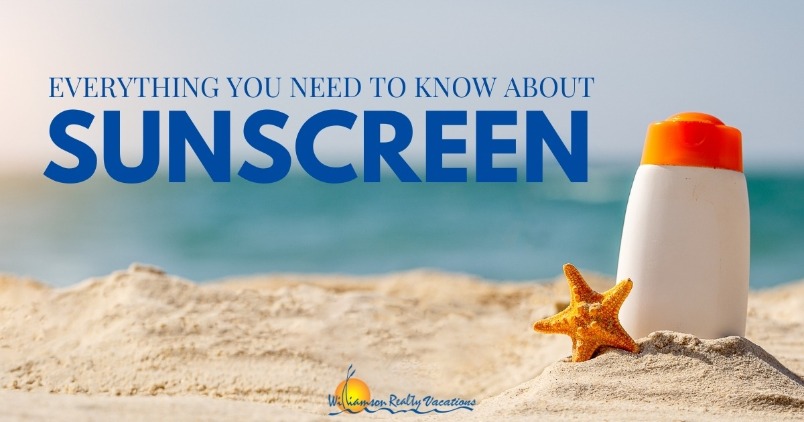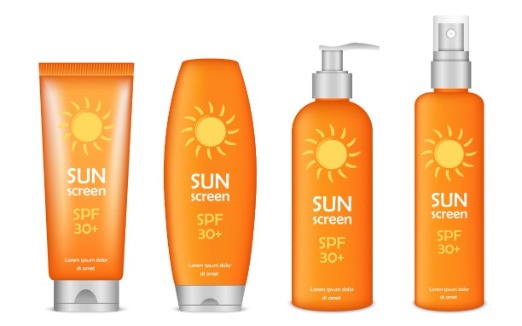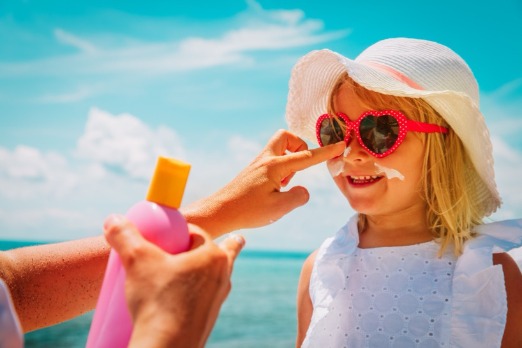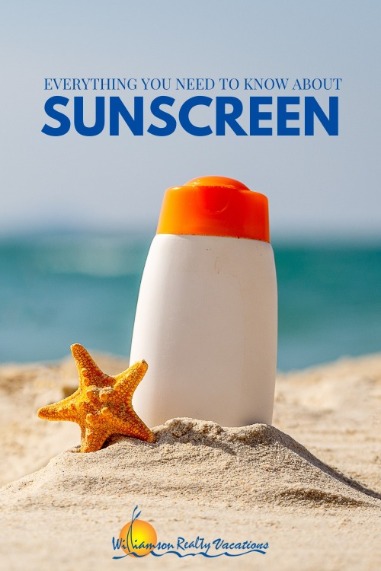
It has been a long winter and if you are like us, you are ready to enjoy that beautiful Carolina sun. Every serious beach goer knows that picking the right sunscreen can make or break your day. We might assume that all sunscreens are the same, but that’s actually not true! There are actually a lot of choices on the market, and it’s important to understand the differences between them. This week we have everything you need to know about sunscreen to help you protect your family during your Ocean Isle Beach summer vacation.
What’s the best sunscreen to use?
When looking to purchase a sunscreen there are a few things that you should look at. Dermatologists recommend buying a sunscreen with an SPF rating of at least 30. You will also want to make sure the sunscreen offers “broad spectrum” protection against both UVA and UVB rays, which are both harmful to the skin. Sprays, creams and lotions all work well, as long as they are applied properly.

Sunscreen or Sunblock?
Is sunscreen the same as sunblock? Before we dive in, let’s clarify: sunscreen and sunblock are not the same. As the name implies, sunblock actually blocks UV rays from reaching the skin, whereas sunscreen does not. Instead, sunscreen absorbs the UV rays when they reach the skin. The difference between sunscreen and sunblock lies in the ingredients. Sunblock is typically made from mineral ingredients like titanium dioxide and zinc oxide. Sunscreen, on the other hand, is made from chemical ingredients like benzophenones (oxybenzone), cinnamates (octyl methoxycinnamate and cinoxate), sulisobenzone, and salicylates.
Do expiration dates matter?
Almost all (and certainly any quality sunscreens) have a listed expiration date. By law, the FDA requires all sunscreens to have an effective date of at least three years. If you have sunscreen that is expired or older than three years, you shouldn’t use it. Another pro-tip: If your sunscreen has changed colors or been altered you shouldn’t use it.
How to help your sunscreen work best
Sunscreen should be one part of your sun protection plan. However, it shouldn’t be all you use. If you are going to be on the beach, in the water or out in the hot sun for any significant amount of time, you should consider wearing a hat, using an umbrella and think about wearing a long sleeve UV protected shirt.

Careful with the little ones
Babies and toddlers have sensitive skin that is more prone to getting burned than adults, so sun protection is incredibly important. However, babies need to reach a certain age before you apply sunscreen to their skin.
How and when to apply
Sure, it sounds simple. Just slather on the sunscreen and hit the beach. But, there is a little more to it than that. In fact, applying sunscreen should be done at least fifteen minutes before heading outside. It should be applied to cool and dry skin. Once outside it is important to reapply sunscreen. Even if it says it is waterproof, reapplying guarantees the effectiveness of the product.
Tip – Sunscreen is not waterproof and per FDA guidelines sunscreen cannot be marketed as waterproof. If it says it is, it isn’t.

Now that you have your sunscreen picked out, all that is left to do is to book your next Ocean Isle Beach vacation. Do you need help finding the perfect home for your family? If you do, we have reservationists standing by ready to help you with all of your vacation needs. Give us a call today at 800-727-9222 or click the button below to see our current selection of vacation homes.

Book a sun soaked ocean isle Beach Vacation Today.
Like and follow us on your favorite social media.


